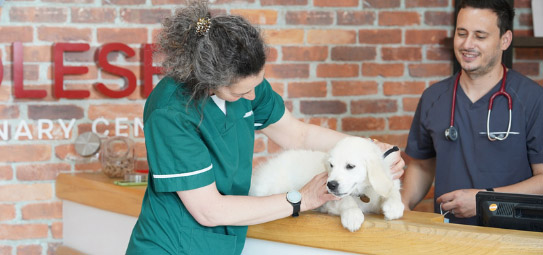
Darren warns pet owners about spring poisons in the home and garden
March 14, 2023
Spring is a time of renewal and growth but for pet owners, it’s also a time to beware of potential dangers in the home and garden. Here are a few things to keep in mind to keep your furry friends safe as the weather warms up in Surrey.
1. Pet poisons in the garden
As temperatures increase and flowers start to bloom, it’s important to be aware of the potential toxins in your garden. Common spring flowers such as daffodils, tulips, and lilies can be highly toxic to dogs and cats. If ingested, some plants can cause vomiting, diarrhoea, and even death. Keep a close eye on your pets when they’re outside and make sure they don’t have access to any potentially harmful plants.
To help you, Heather and the rest of our nursing team have put together a handy infographic showing common poisonous spring garden plants and symptoms.
Download our spring plants guide
If you suspect any poisoning, don’t wait for symptoms to appear; call our Park Road surgery immediately on 0208 979 1384.
2. Fertilisers
Many fertilisers on the market contain ingredients that can be toxic to dogs and cats if ingested. Look for fertilisers that are labelled as pet-safe, or use natural alternatives such as compost or bone meal.
IMPORTANT:
- Keep pets away from treated areas: Even if you’re using a pet-safe fertiliser, it’s important to keep pets away from treated areas until the fertiliser has been completely absorbed into the soil. This will help prevent accidental ingestion.
- Be aware of the signs of fertiliser toxicity: If your pet does ingest fertiliser, they may show symptoms such as vomiting, diarrhoea, and loss of appetite. In severe cases, ingesting fertiliser can lead to kidney damage. If you suspect your pet has consumed a toxin, contact our Park Road surgery on 0208 979 1384 immediately.
- Store fertilisers safely: Keep fertilisers in a secure location out of reach of pets. Also, read and follow the label instructions carefully.
- Don’t over fertilise your garden: Too much fertiliser can cause harm to both plants and pets. Also, use it according to the right time and stage of the plants’ growth.
3. Pesticides and herbicides
Spring is also the time when many people in Surrey start to work in their gardens, which can mean using pesticides and herbicides. These chemicals can be highly toxic to pets if ingested or inhaled and can cause serious health problems. Heather advises that you should keep pets away from treated areas and consider using natural alternatives whenever possible.
4. Spring cleaning
As you start to do your spring cleaning, be aware of the potential hazards that may be lurking in your home. Cleaning products and other chemicals can be toxic if ingested so be sure to keep them out of reach of pets. Additionally, make sure to keep an eye out for any small items that your pet might accidentally ingest, such as buttons, coins, or rubber bands.
Remember to download our toxic plants guide
Heather also recommends sharing this article and our spring garden poisonous plants infographic with friends and family and being vigilant if you take your dog to anyone else’s home.
In summary, by being aware of these potential dangers and taking the appropriate precautions, you can help to ensure your pets have a safe and healthy spring:
Always keep a close eye on your pets, especially when outside
Keep all cleaning agents, pesticides, and toxins far from them
Choose organic gardening options which are safer for your garden and pets, or pet-safe products
If you suspect any poisoning, don’t wait for symptoms to appear, contact our Park Road surgery immediately on 0208 979 1384.



